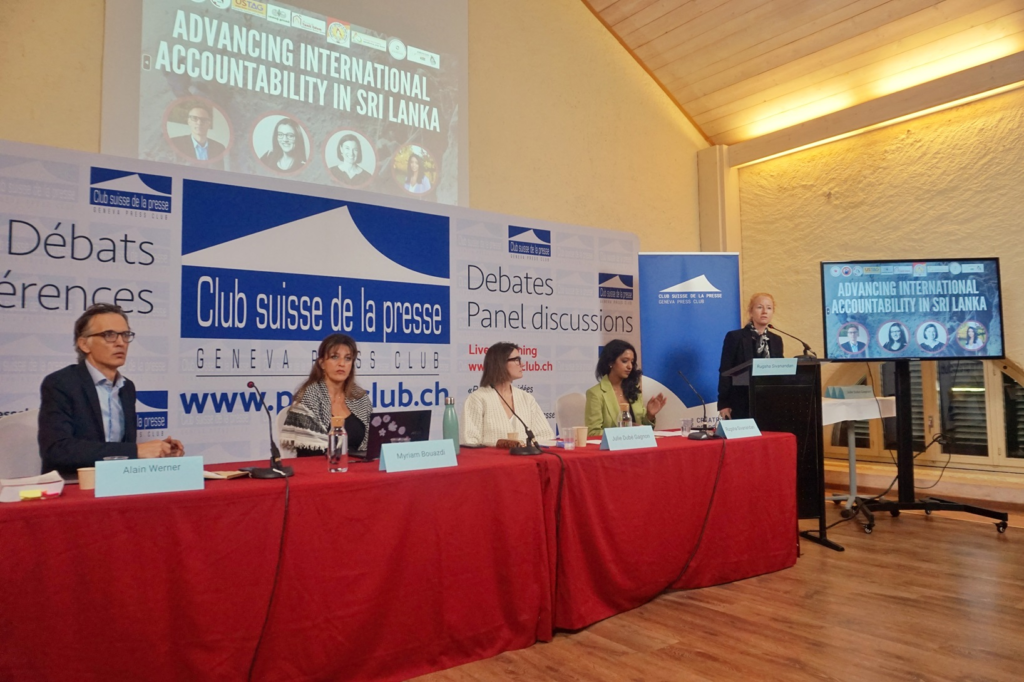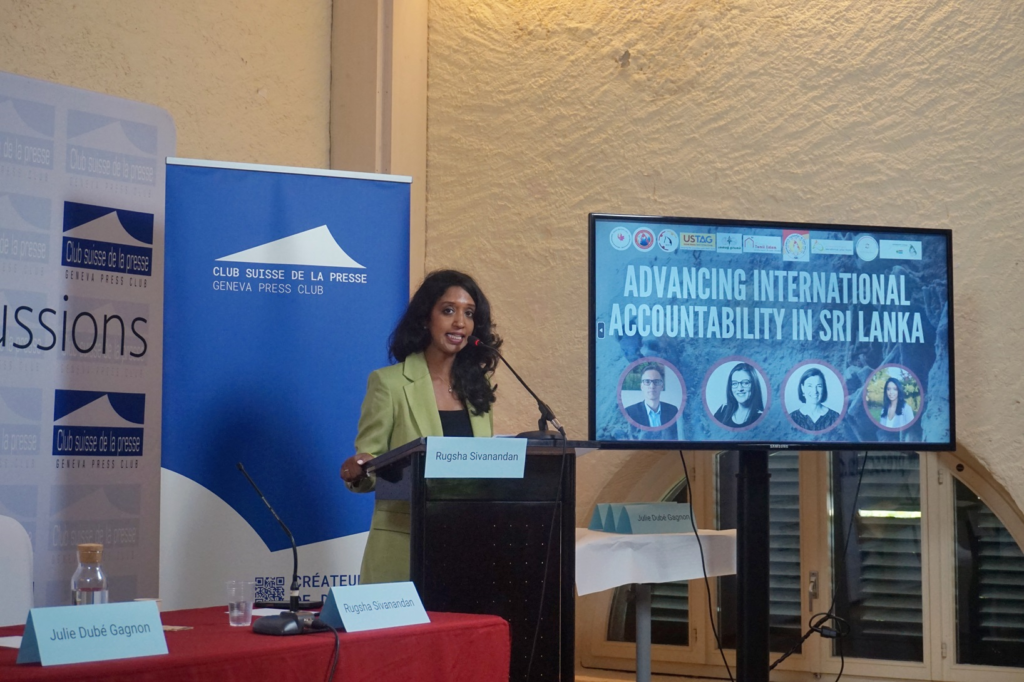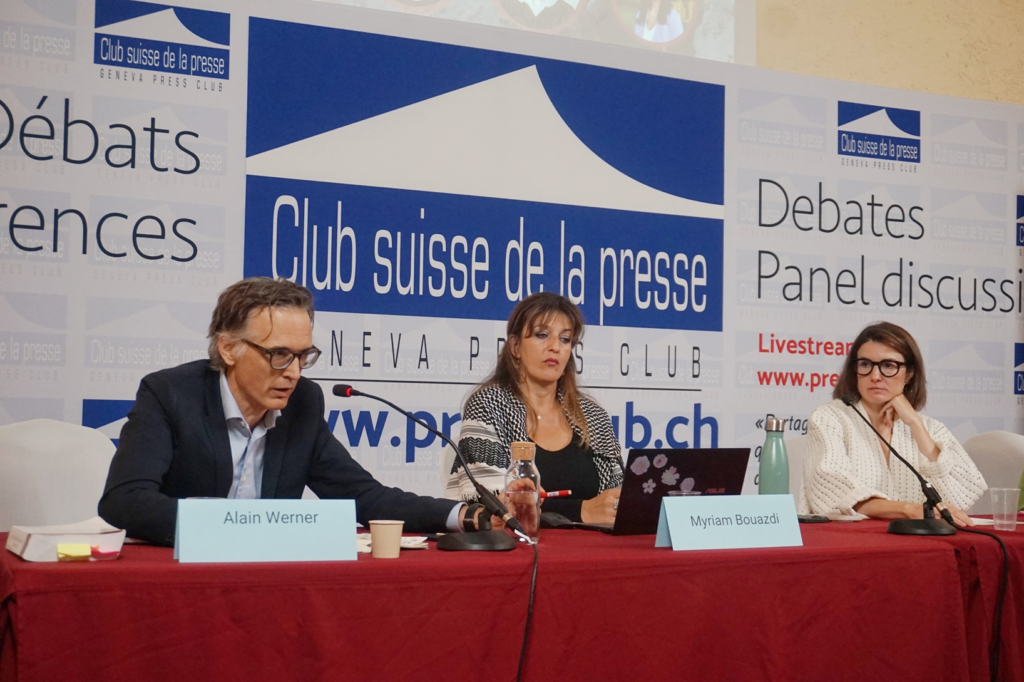Sri Lanka must face international courts, say experts at Geneva panel

The National Council of Canadian Tamils (NCCT) hosted a high-profile panel discussion at the Geneva Press Club this week, where international legal experts and Tamil civil society representatives reiterated that accountability for atrocities in Sri Lanka can only come through independent international prosecutions, not domestic mechanisms.
The event, titled “Advancing International Accountability in Sri Lanka,” took place on 10 September 2025 and featured panellists Alain Werner (international criminal lawyer), Myriam Bouazdi (international criminal lawyer), Julie Dubé-Gagnon (investigator of sexual and gender-based crimes), and Sri Gnaneswaran of the Tamil Civil Society Forum. The discussion was moderated by NCCT Executive Director Rugsha Sivanandan.
Rugsha Sivanandan opened the panel with an overview of the situation in Sri Lanka, highlighting the importance and urgent need for international accountability to combat the entrenched systemic impunity that has persisted. She highlighted the necessity of establishing an international independent investigation and prosecutorial mechanism that has the trust and confidence of the victims and survivors to hold perpetrators accountable and achieve remedial justice for the Tamil people, given Sri Lanka’s unwillingness to take concrete steps to address accountability and justice for the war crimes, crimes against humanity, and genocide committed against the Tamil people.

Sri Gnaneswaran, member of the Tamil Civil Society Forum from Sri Lanka’s Northern province, provided a video statement explaining how since 1948, the Sri Lankan government has carried out genocidal wars, genocidal pogroms, genocidal massacres, state-sponsored schemes such as surveillance, intimidation, harassment, arrest, violence, torture, buddhisization, colonization, militarization, sinhalisation, enforced disappearances, and land grabs against the Tamil people that continues until today. He highlighted how these acts of genocide are aimed at destroying the attributes of the Tamil Nation and continuing the subjugation of the Tamil people in the island of Sri Lanka even today, resulting in the ongoing Tamil Genocide. He also highlighted Chemmani, the current excavation process, its importance, how the Tamil people in Sri Lanka and internationally are recognizing the importance of Chemmani and the sense of urgency it has caused for a fully internationally owned credible, independent, investigative and prosecutorial mechanism for investigation.
Alain Werner, International Criminal Lawyer with expertise in participating on the side of the victims to some of the most significant trials for international crimes, drew on his decades of experience prosecuting war crimes, crimes against humanity, and genocide in international courts. He highlighted the resilience of the Tamil people and the importance of persistence in seeking justice. While acknowledging the UN’s efforts in evidence preservation through the Sri Lanka Accountability Project, he stressed that meaningful accountability will only come through independent international prosecutions. Alain highlighted the concept of extraterritorial or universal jurisdiction, which involves prosecuting international crimes in foreign national courts when local justice is impossible. Using examples of laws from Liberia, Argentina, France, Belgium, and the U.S., he outlined how victims with the support by the civil society, it allowed for the arrests and trials regardless of where the crime occurred or the nationality of the perpetrator. Alain also stressed the important role of the Tamil community, preparing complete case files with documented evidence. Alain concluded by stressing the importance of international law, noting that crimes do not expire under statutes of limitations, and urged the Tamil people to pursue justice through various national courts and legal jurisdictions. His remarks underscored the potential for accountability through local action and international collaboration, while recognizing the urgency of addressing these issues in Sri Lanka.
Myriam Bouazdi, International Human Rights and Criminal Lawyer, with experience serving in UN accountability mechanisms, including the IIIM and the Commission of Inquiry on Syria, and investigating violations in Sri Lanka with international NGOs, advising on justice and accountability processes, emphasized the central role of victims and survivors in shaping accountability efforts. She noted that Tamil victims and civil society groups have been at the forefront of documentation and advocacy, often at great personal risk. She warned against “false solutions” through weak domestic processes and reiterated that only mechanisms trusted by victims can deliver justice. Myriam emphasized the importance of collecting criminal-standard evidence, not just human rights documentation, and how consent, documentation standards, and chain of custody are essential to make evidence usable in court. Although civil society organizations have been vital in collecting this data, but face limitations like a lack of consent or access to victims. Myriam also referenced the most recent report by the UN High Commissioner for Human Rights on Sri Lanka, emphasizing ongoing impunity, lack of justice, and failure of both the Sri Lankan government and the international community to ensure accountability for victims. Despite government promises of reform in Sri Lanka, she reiterated that there’s little meaningful progress on accountability, legal reforms, or transitional justice.

Julie Dubé-Gagnon, a Canadian jurist with experience investigating specialized sexual and gender-based crimes (SGBC) and gender analysis UN criminal accountability mechanisms, including the Independent International Commission of Inquiry on Ukraine, the Independent International Fact-Finding Mission on Myanmar, the Independent International Commission of Inquiry on the Occupied Palestinian Territories (Gaza), and the Independent International Commission of Inquiry on Burundi, shed light on the underreported dimension of sexual and gender-based violence (SGBV) in Sri Lanka. Julie explained the critical role of applying an intersectional gender lens in criminal investigations of international crimes, particularly within the context of a potential independent accountability mechanism for Sri Lanka, similar to those for Syria and Myanmar. She highlighted that without a gender lens, the experiences of large portions of the population (especially women and gender-diverse people) are ignored. She stressed that gender impacts how harm is experienced, how perpetrators target victims, and how communities are affected. Julie also emphasized the crucial importance of psychosocial support for victims, especially of torture or sexual violence, who need trauma-informed care during interviews. Without proper support, investigations risk re-traumatising victims and collecting incomplete or invalid evidence. In conclusion, Julie urged that a gendered, intersectional approach must be applied to all crimes, not just sexual or gender-based ones, which will ensure victim-centered, trauma-informed investigations, allowing for more robust case files.

Leave a Reply
You must be logged in to post a comment.